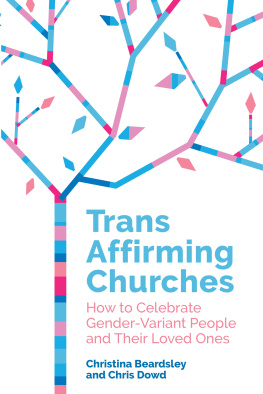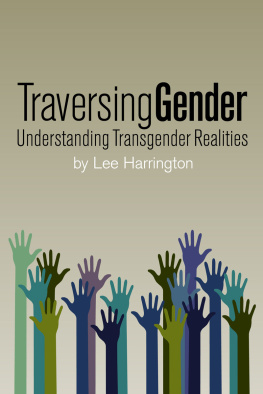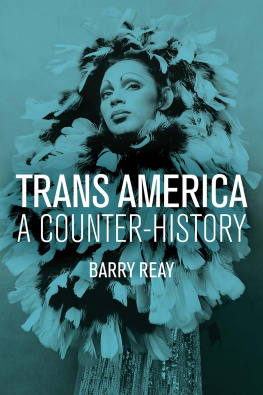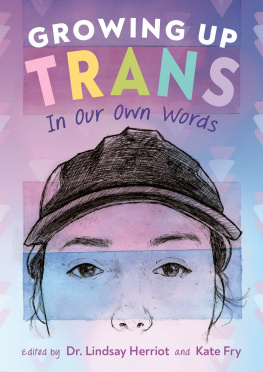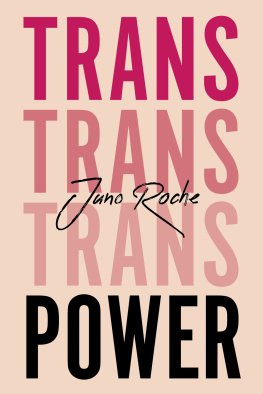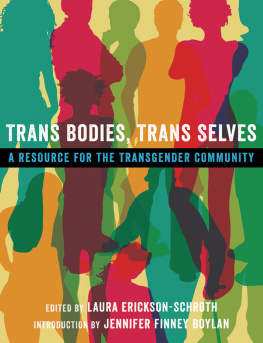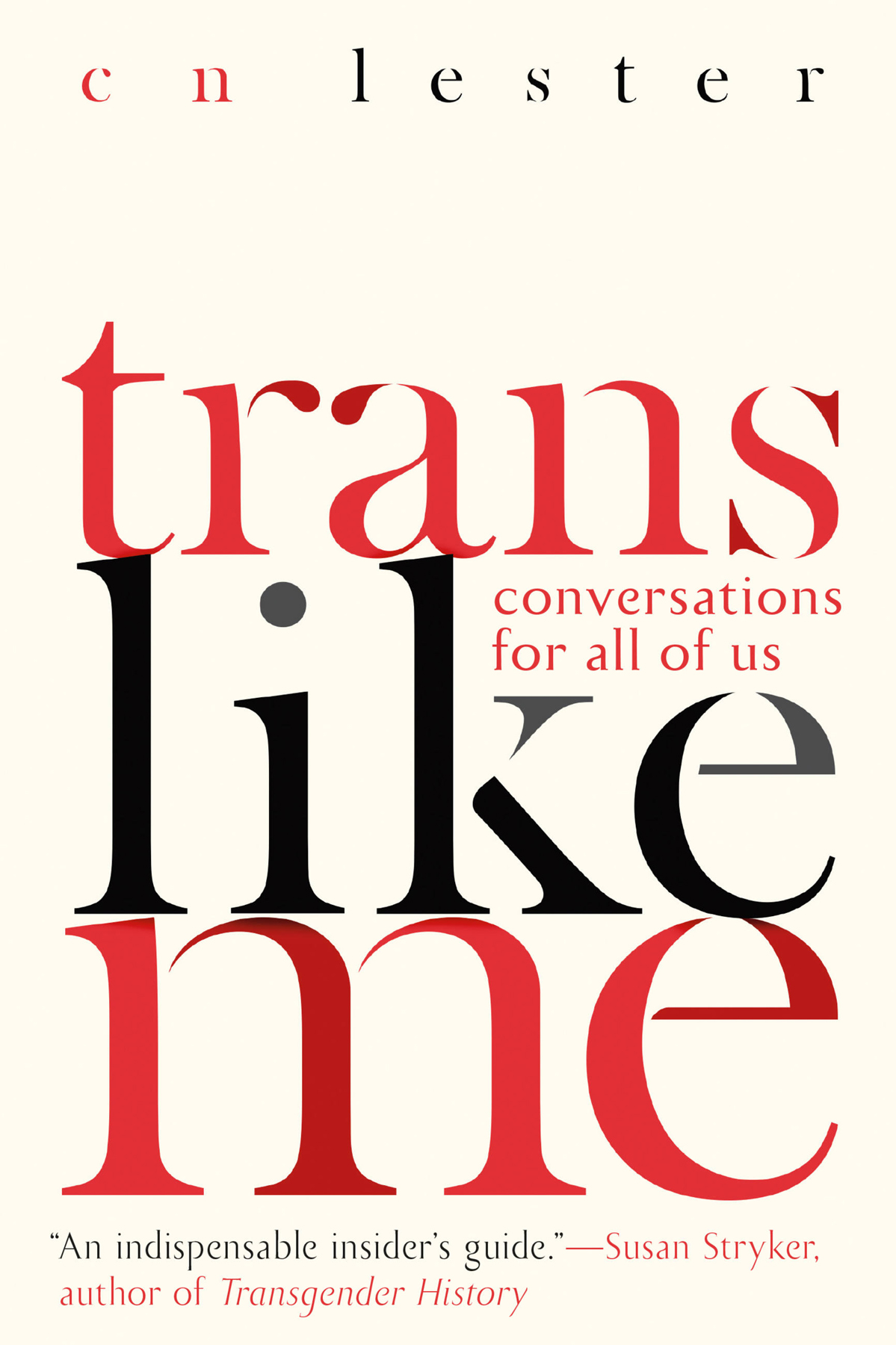Hachette Book Group supports the right to free expression and the value of copyright. The purpose of copyright is to encourage writers and artists to produce the creative works that enrich our culture.
The scanning, uploading, and distribution of this book without permission is a theft of the authors intellectual property. If you would like permission to use material from the book (other than for review purposes), please contact permissions@hbgusa.com. Thank you for your support of the authors rights.
Published by Seal Press, an imprint of Perseus Books, LLC, a subsidiary of Hachette Book Group, Inc. The Seal Press name and logo is a trademark of the Hachette Book Group.
The publisher is not responsible for websites (or their content) that are not owned by the publisher.
Names: Lester, CN, author.
Title: Trans like me: conversations for all of us / CN Lester. Description: First US edition. | New York, NY: Seal Press, [2018] | Originally published in trade paperback and ebook by Virago in May 2017.
Identifiers: LCCN 2017051262 | ISBN 9781580057851 (pbk.) | ISBN 9781580057844 (ebook)
Subjects: LCSH: Lester, CN | Transgender peopleBiography. | Transgender peopleIdentity. | Transgender peopleConduct of life.
W hat does the word trans mean to you? A term picked up from magazines, newspapers, the internet? A way of describing a colleaguemaybe even a friend or family member? A phenomenon affecting other people? Or, perhaps, a facet of who you think you might be?
When I work with organizations to provide trans diversity training, I always begin by asking for other peoples definitions. Inevitably, writing them up, I run out of space on the whiteboard. Suggestions for what trans means includes people who were assigned one sex at birth (male or female) who medically transition to the other, people who live as the opposite sex without surgery or hormones, people who combine or blur sex and gender categories, and people who cross-dress. Participants suggest words and meanings: transsexual to mean someone who has or wants to transition; transgender to indicate a wide variety of unusual gendered experiences; and genderqueer, gender-neutral, and non-binary to mean someone who complicates the simple division of female and male, combining or denying these categories.
All of these ways of being can be included in the word trans. Any person who has had to challenge or change the sexed and gendered labels placed upon them at birth to honor their true selves can, by their own or others volition, find themselves under this trans umbrella. The category of trans can be an uncomfortable place to be, filled with the fears society has about disruption, fitting in, danger, and change.
It is also a place filled with unlooked-for knowledge, new experiences, new perspectives, and unanticipated joy.
This is a book about genderhow we all live it, how we think about it, why we do and think what we do. It is also about how some of those things have changed and will change. It is a book about what it is to be trans, to be a woman or a man or a person who is neither, in different times and in different places. It is about our gendered words, and how those words lead to the concepts, laws, and categories that shape our frequently conflicting realities: our families, our love lives, our place in the world. It is a book about my journey through gender, sex, selfhoodand, if you want it to be, about yours.
Throughout this book, Im going to break down the most common myths about trans lives: panic about sex changes for young children, the fear of trans people in bathrooms and changing rooms, and the assumption that being trans is a faddish new trend. A little knowledge is a dangerous thing; luckily, we have a wealth of information about what it is to be trans, and how the world is changing and growing in response to the challenge of trans lives.
Inevitably, when we talk about being trans we have to talk about transphobia. It is hard to live it; it can be hard to read it. It is so tempting to become defensive, to shut down and try to shut it out, to ignore it until it goes away.
But weall of uscannot fix this problem until we look it square in the face. And what it is that we gain from embracing the truth of trans existence is so great, so important, that this is a challenge we must take on. We cannot have the good without tackling the badand the good is better than we have ever been taught to expect.
I came out as trans half a lifetime ago. In all those intervening years, I have had my share of hardships, but I have never regretted the decision to tell the truth about my gender. I cannot put a price on the wonder of being at peace with who I am, and of living my life as my whole, authentic self. I believe we all deserve a chance at that happiness.
Opening ourselves up to the trans experiencewhether or not we ourselves are transmeans embracing a new way of seeing the world. It requires trust, empathy, and imagination. It is not a one-way process, but a journey we are all on together.
This is one book, and one story, out of millions. This is a work in progress.
.
, October 2014: Monster Chef and the She Male.
: Pediatrician: Transgender Ideology causing child abuse.
.
.
Here are a few of the things the media shows, and has shown, trans people to be: confused, deceitful, delusional, damaged, predatory, brave (sometimes), pitiable, pathetic. A punch line, a warning, a mistake.
Here are a few of the things I am: a singer, a teacher of music, a good (if forgetful) friend, a loving child and grandchild, a loved and loving partner. I am a doctoral student, a decent cook, too ambitious, too anxious, a composer of all kinds, and someone who tries, at least, to be better than my worries would have me be. And Im also transgender.
. Referring to her as he, Littlejohn warned that Meadowss mere presence would have a devastating effect on her young pupils. [Meadows previous name] is entitled to his gender reassignment surgery, but he isnt entitled to project his personal problems on to impressionable young children.
As a teacher of students ranging in age from five years old to fifty, I had never before heard about projecting my personal issues onto my pupils. My lesson plans focus mostly on technique, creativity, and personal growth, with a side order of self-confidence boosting and chatting about musical history. My private life doesnt come into it. I dont hide who I am with my students and their families, and neither do I dwell on it; the fact that I am trans is as fundamental as any other part of me, but far less important in this context than my knowledge of vocal production and how best to play staccato. I teach for many reasons, but most of all because my own music teachers gave me so much, and I have a debt to repay through sharing the joy of making music. It makes no sense to me that my support of my young students would somehow rob them of their innocence, nor can I interpret the work I put into others learning as selfish.


